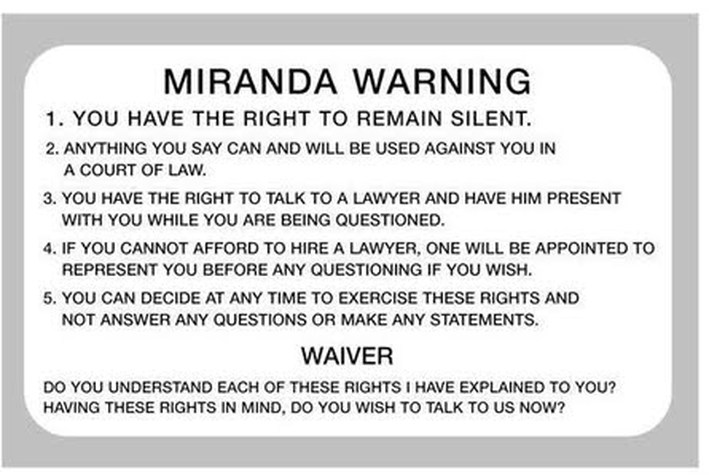The Failure to Give Miranda Warnings
If the police fail to give Miranda warnings to a suspect in custody, that person’s statement might be ruled inadmissible in court. This can lead to a dismissal of all charges.

“Anything you say can and will be used against you.”
“You have the right to remain silent. Anything you say can and will be used against you in a Court of Law.” Many of us recognize this statement as the beginning of the “Miranda Rights.” This critical right was established in the United States Supreme Court case Miranda v Arizona. The police must read Miranda Rights to someone who is in custody before questioning. The court case established that statements made by a suspect are admissible in a court of law only if the police read that suspect their Miranda rights. Failure to give Miranda Warnings can result in the suppression of a suspect’s statements during custodial interrogation.
If you were recently arrested and were not read your Miranda Warnings, it is vital that you share this information with your attorney. If the arresting officer did not recite your Miranda Rights during the arrest, your lawyer could attempt to keep any incriminating statements you made out of the courtroom. You should have the best legal representation possible if you face misdemeanor or felony charges or allegations. LEWIS & DICKSTEIN, P.L.L.C. is one of Michigan’s most trusted legal teams, with a proven track record of success.
“What are Miranda Warnings?”
The Miranda Rights can be broken down into four parts; the right to remain silent, anything you say can and will be used against you in court, the right to an attorney during police questioning, and the right to a court-appointed attorney if you cannot afford one. Many citizens are unaware of their rights. Individuals familiar with their legal rights are often caught up in the emotional distress of being arrested. Some people cannot remember if the police read Miranda Rights or the circumstances of their arrest and interrogation. Hiring a seasoned attorney will help you form a pragmatic, methodic defense.
Police officers often take shortcuts when informing suspects of their rights. Defense lawyers routinely see cases where there is a failure to give Miranda Warnings to the defendant. In a recent case, a police officer advised a suspect that he had the right to an attorney, but the officer did not advise the defendant that he had the right to an attorney “during questioning.” The Supreme Court found the Miranda warning invalid and suppressed the incriminating statement. Without a top criminal defense lawyer, this slight nuance would have been missed, and this defendant would be in prison.
What is the law concerning failure to give Miranda Warnings?
When are you supposed to be read your Miranda rights? Under the law, “Miranda Rights” must be read if you are asked any questions by police while in custody. A police officer will not read you Miranda Rights if they approach you on the street, engage you in conversation, or pull you over for a routine traffic stop. When you are handcuffed by an officer and placed in a cop car, you should be read “Miranda Rights” if the officer intends to question you. If you are in custody and a detective attempts to ask questions, he has to give Miranda Rights, or any answers given will not be admissible in court. There are scenarios where Miranda Rights do not apply.
What should I do if asked questions by the police?
You should immediately invoke your right to remain silent and demand an opportunity to hire a lawyer. If there is any reason to talk to the police, you can decide whether to submit to questioning at a later time and with expert legal counsel. There is no rush to speak to the police! If an officer threatens to keep someone in jail unless they answer questions, this is even more of a reason not to trust the officer and demand a lawyer. If the police read your Miranda Rights, the best thing is not to speak or answer any questions.
Should you talk to the police if you are not guilty?
No! The sad reality is that police are not seeking to find the truth; they attempt to build a case. In addition to the words you might use when answering questions, every gesture, eye movement, nod of your head, and tone of your voice will be scrutinized. Even though you deny involvement in a crime, the officer may say you acted suspiciously or nervously or made inconsistent statements. In many cases, an officer can misinterpret an innocent answer or, worse, lie about something a suspect said while in custody. Think about it; the Miranda warning is that anything you say “can and will” be used against you. Never talk to the police alone!

Protecting and Defending the Accused
LEWIS & DICKSTEIN, P.L.L.C. is one of Michigan’s top legal defense teams and stands ready to defend your freedom in state and federal court. If you call us, we will take the time to talk with you, answer your questions, and address each of your concerns. Our lawyers have an unparalleled track record of success, and we will find a way to help you.
Call us today at (248) 263-6800 for a free consultation or complete an online Request for Assistance Form. We will contact you promptly and find a way to help you.














